Displaying items by tag: Peter Malone's Movie Reviews
Lobo Feroz/ Ferocious Wolf
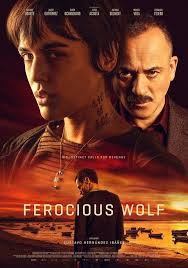
LOBO FEROZ/ FEROCIOUS WOLF
Spain, 2023, 104 minutes, Colour.
Adriana Ugarte, Javier Gutierrez, Ruben Ochandiano, Juana Acosta, Manual Vega.
Directed by Gustavo Hernandez.
As suggested by the title, this is a very grim film. It focuses on paedophile behaviour, the role of the law and the behaviour of vigilante avengers. It is based on an Israeli film of 2013, Big Bad Wolf, and this version is, at times, very difficult to watch.
It opens, in black and white, with a past episode of young girls being pursued by a giant man who says he is the big bad Wolf – and the indication that he will molest them.
Then, in colour, in the present, a tough police officer is interrogating a suspect, brutally, leading to his suspension and the release of the suspect. While there is a police investigation, led by a woman officer who has been taunted by her fellow male officers, the suspended man continues his pursuit, stalking the accused who is a teacher at school, seen playing the piano for the school choir rehearsal but the students passing around a note accusing him.
We are introduced to a fierce young woman, Matilde, who was one of the girls menaced in the opening sequence, has later shot an assailant, her father going to prison to save her, but her later going to prison for robbery. Her birth daughter, later adopted. Vengeful, she abducts the accused and torments him, parallel to the way that her daughter was tortured, broken fingers, toenails drawn…
But, she also overcomes the suspended police officer, imprisoning him, his collaborating with her though tied up. The accused, however, denies everything, refuses any information.
The drama moves between the basement where the interrogation/torture is going on and the police investigation. Matilde’s father also becomes involved there are complications when the suspended policeman is able to escape and ask for help. Meantime, the police investigation narrows down the search for a final confrontation.
With attention, the audience is not always sure whether the accused has actually committed the crimes or not. And, there is more sympathy for the suspended policeman as the drama moves on. And, then, his daughter is abducted and disappears.
The film certainly demands audience attention but, as said, is often difficult to watch, especially the torture sequences.
- The title, the symbolism of wolves and prey, the prologue, black-and-white, the children playing, little girls, the big man, pretending to be the wolf and frightening them, the menace, the shadow, unbuttoning his shirt…? Setting the tone?
- The Spanish setting, the town, homes, basements, police precincts, atmosphere? The surrounding countryside, atmosphere? The musical score?
- Moving to the present, Alonso and his role as police, with Elias, the interrogation, vicious, torture? The response of the police chief? Having to let Elias go? Suspending Alonzo? Allowing him to investigate further? Alonso and his relationship with his wife, the phone calls, love for his daughter, at her dance class, her disappearance and its effect on him?
- Elias, at school, the piano, the note, the accusations? The situation with the death of the little girls, torture, the finding of the boat, the girl without a head? Audience response to Elias, believing him guilty or not? Alonso stalking him, in the street, the car almost crashing, Elias helping the old lady across the street? The continued confrontations?
- The scene of the mob, the betting, the fistfights, Matilde and her intervention, her strength, relationship with her father? The later explanations, her being molested as a girl, the opening sequence, the effect on her, her behaviour, killing her assailant, her father going to prison for her, her later career, in prison for robbery, out, the daughter adopted, her wanting vengeance, the stash of money, relationship with a lawyer, sexual, the drugs, grinding them, the making of the cake? The abduction of Elias?
- The visuals of the abduction, the investigation by Alonzo, her subduing him? Inviting him to collaborate, his theory of a psychopath confronting a psychopath? Audience hearing the details of the torture of little girls? Elias and his stoic refusal to admit anything?, The implements, fingers, nails, hanging him? His refusal to answer? Alonso persuading him to give information, the location for the girl’s head, Matilde and her driving, digging, the lie?
- Alonzo, audience sympathy or not, abducted, imprisoned, collaborating, urging Elias to tell the truth? His getting free, going to get help, the news about his daughter’s abduction?
- Matilde and her father, his suspicions, going with her, wanting to torture Elias, the incident with the cake, his collapse, the fire?
- The police, Vidal, the men at the station mocking her, her being commissioned to investigate, her relationship with Alex, treating him as an office, his contributions, getting information, the search of the house, getting reinforcements, going to the basement, the confrontation, shootings, Alex shot, Matilde wounded, escaping, the confrontation with Vidal and the story of her dead son, Matilde wanting his name?
- The symbolism of the wharf, the encounters with Matilde, in the countryside getting her money, on the road coming back after the search, the final confrontation? The behaviour of the wall?
- Alonzo, his daughter’s abduction, the audience seeing her banging on the wall, not heard? And the Vidal’s return…?
Contraattaque

CONTRAATTAQUE
Mexico, 2025, 84 minutes, Colour.
Luis Alberti, Leonardo Alonso, Luis Curiel.
Directed by Chava Cartas.
An action show designed for those who enjoy them, brief running time, continuous action, some serious moments, violent moments. And, the setting is familiar enough from many films from the US and Mexico, where this film is from. The cartels, the brutal leaders and their militias, havoc on ordinary citizens, the response of the police, and military special forces.
At the centre of the film is a group of elite special forces, their becoming involved in action against the cartels after a mother and daughter discover a mass grave out in the countryside and they are abducted. The special force has five members – and, memories of films like The Magnificent Seven, these are magnificent five, each with their own character clearly developed, and working together, especially when they are ambushed on the road, and have to make their escape through the countryside, pursued by the cartel chief and his militia, finishing up with the siege of a cartel building, the five inside, the militia outside.
This is what this film set out to do – and does it quite efficiently and effectively.
- The title, expectations? Action show, brief running time?
- The Mexican setting, the cartels and their influence, power, violence? The cartel leaders? The police, the special action forces? Corrupt politicians?
- The opening on the road, the Mexican countryside, the crash, the fight? Later reprised? Setting the tone, the captain and his team, their skills? Military, with the government? The contrast with the cartels, their forces, militias?
- The introduction to Carla and Lucia, at home, ordinary, going to work, pregnant, sick by the roadside, the discovery of the mass grave, the reporting it, observed by the militia, abducted and imprisoned?
- The cartel leader, seen at home, his twin daughters, cooking? His communication with the militia, his brother, bravado, conflicts with the military? His going into action himself?
- The group, the captain and his leadership, skills? The other members of the team, their personalities, skills? Tanque, older, loyalties, expertise? Pollo, young, a hunter, sniper and his abilities? The doctor and his involvement? Toro, hesitations, joining in? Seeing them in action, the reprisal of the crash, their heading out towards the border, pursued, fighting back? Injuries? Going to the house, eliminating the guards, finding the women? The drama of the siege, the tactics, shooting, ammunition, grenades, power guns, the secret passage, the explosions? Survival? Tanque dying?
- The women, rescued, fears, growing involvement, weapons, the attacks? Surviving?
- The portrait of the cartel militia, the women in leadership, the filming of the bribe to the government Secretary, their taking the captain’s phone, tracking every movement? Tactical advantage?
- The final confrontation, the cartel leader, the hand-to-hand fights with the Captain, his defeat?
- Familiar material, efficiently done, continue to action for the fans, and some delineation of the chief characters?
Inside/ Australia 2024
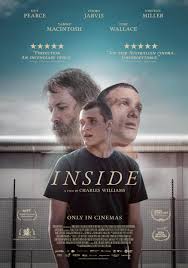
INSIDE
Australia, 2024, 102 minutes, Colour.
Guy Pearce, Cosmo Jarvis, Vincent Miller, Toby Wallace.
Directed by Chris Wallace.
On the one hand, the title, Inside, suggests prison. On the other hand, it could also suggest going into the interior of a person, their personality, motivations and behaviour. Both are relevant here.
There is an arresting prologue to the film, a wedding ceremony which we see taking place in the prison, a pregnant mother, a criminal father – and the focus then on the child, now a late teenager, and his being condemned by his criminal father and inheriting his guilt.
The young man is Mel (Vincent Miller convincing in his first film role), transferred to a prison, assigned to share a cell with a lifer, sentenced for vicious crimes of rape and child murder. He is Mark Shepard, a powerful performance by British actor, Cosmo Jarvis. But we soon learn that there is a reason for this sharing. Mark has got religion, holding his own services in the prison chapel, more than a touch of charismatic faith, testimony are to the fellow prisoners, speaking in tongues, finding that Mel has his own keyboard, enjoys playing it and so invited to play during the happenings in the Chapel.
So, already a different kind of prison film. There are guards, there are glimpses of the criminals but not in the traditional way of prison films. There is a greater freedom of movement, many sessions to prepare those for whom parole is coming up, getting them to write a letter of apology to their victims as a justice healing exercise, a different atmosphere.
And, yet, not entirely, a new character, Warren, played by Guy Pearce a veteran facing parole but seemingly unwilling to face it, granted a day’s leave to visit his son, played by Toby Wallace, not going well, Warren an enigma. But, he is a gambler, and, to pay his debt there is a bounty on Mark Shepard, and Warren choosing and grooming Mel to be the killer, and so find his place in the prison.
Which means then that the film operates as a psychological thriller, the interactions between the three men, the religious mania of Mark, the manipulation by Warren, Mel and memories of his killing a student in the past, the pressures on him – a dramatic resolution of Mark’s fate.
An interestingly different Australian prison film.
- The title, the prison meaning, the inner psychological meaning?
- The action in the prison, find entry, allotment of cells, the cells, the meeting rooms, offices, workplaces, the Chapel? Resemblances to prison films? Differences in terms of guards, cells, supervision? The musical score?
- The story of Mel, the prologue with the wedding in prison, the pregnant mother, the prisoner father, his legacy to his son, the passing on of the criminal mentality? The flashbacks to Mel, as a boy, the clashes, his killing his opponent? Sentenced to prison?
- Mel, as a character, his past behaviour, family heritage, age and immaturity, susceptibilities? Discussions with the authorities? His being sent to share with Mark? His keyboard? This leading to his presence in Mark’s evangelical gatherings? Mel and his learning through sharing with Mark? The encounter with Warren, Warren as a father-figure, genial, the touch of the sinister, the issue of the bounty on Mark, the imposition on Mel, to prove himself, his acceptance, in the challenge, unwell, the pressure on him?
- The focus on the authorities, sympathetic, relationship with the prisoners, especially the discussions and meetings concerning parole readiness, the issue of writing letters to the victims? Mark in for life? Warren and the possibility of parole
- Mark, his background, rapist, killing the children, life? His personality, his cell, possessions, the religious experience, explanations, gatherings, Pentecostal-like, his utterances, exhortations, talking in tongues, the men coming, scepticism, critical, yet larger numbers coming to the meetings? His use of Mel, the music?
- Warren, his age, crime, possibility for parole? Father figure, yet sinister, the gambling, his debt, his connection with the controlling prisoner, looks and glances, bounty, Warren and his decision to groom Mel, their interactions? The sinister grooming? Warren the issue of the bounty, going out for the day to see his son, the character of his son, relationship with his father, the emotional impact of the visit? Warren, the return, going to the Chapel, urging Mel?
- The background of the routines of life in prison, seeming ordinariness?
- Mark, the final gathering, Warren and his preparing the shiv, Mel hiding it under the bed and not using it?
- In the meeting, the dowsing of Mark, setting him alight, the conflagration and his death? The impact on Mel?
- Mark, the discovery of the shiv, Mark and its use?
- Warren, the consequences? And his future?
Last Journey, The/ Den sista resan
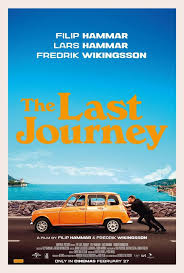
THE LAST JOURNEY/ Den sista resan
Sweden, 2024, 95 minutes, Colour.
Lars Hammar.
Directed by Filip Hammar, Fredrik Wikingsson
The journey is, in fact, from Sweden to the French Riviera. And the passenger for the last journey – a retired teacher much admired by his students, now in old age, his son thinking that he is too settled, has lost his spark and needs some kind of stimulation. Hence the journey, back to his favourite part of France, back into reliving some of his happy past.
The style of the film is docudrama. The characters are real/actual indicating documentary. But the narrative moves like a fiction film.
Many audiences have responded well. The film has been a hit in Sweden. But, for audiences outside Sweden, the question lurks all the way through who is this son, what is his background, who is this best friend who accompanies them on the trip…? The answer is that the duo are two of Sweden’s most famous television personalities. (An Australian audience will almost automatically think of Hamish and Andy.) So, the filmmakers, are taking it for granted that the audiences know who they are, their background, and are happily along for the ride.
The non-Swedish audiences, despite the puzzle of who the men are, are prepared to go along for the ride, especially audience interest in Lars Hammar, the father. Fortunately for this film, the family took a lot of footage in the past, the holidays, during the travels. And we see the farewell to Lars as he teaches his last class, goes into retirement, happy times with his wife and his two children.
Son, Filip finds the family’s old Renault, coaxes, persuades, cajoles his father into getting out of his old chair and going on the trip. It almost doesn’t happen when almost immediately Lars has to go to hospital. But, out of hospital, with the help of map animations indicating the route of the journey, the audience is happy to get into the car and travel through Belgium, and a detour to the memorial of singer-writer, Jacques Brel, Lars’s favourite, then through the French countryside, including an unexpected confession sequence, Lars with a sympathetic priest, and, eventually, to the coastal town of Beaulieu.
Several times, the two men contrive past situations to jog the memory of Lars, to tell a story about Harry Belafonte that he often told sitting in a cafe, his comment about French drivers not stopping at red lights and getting out to squabble, the two men sitting up the exact old situations – and, happily for them as well, Lars tells the story and makes the comments.
Response to the film will depend on one’s age, this reviewer writing from the perspective of being a year younger than Lars and the film, the experience of ageing. Audiences who have looked after their parents, especially in care, reflecting on how they would have handled the situation, whether their parent would want to go on the trip or not. One of the reflections on the film is that Filip, with smiles and love for his father, is really pushing him, forcing him along the way and sometimes the suspicion, perhaps unworthy, that so much of the last journey is very much for Filip’s benefit.
But, the film invites us to happily go along for the ride.
- The title and expectations? The tone of the film, happiness and joy?
- The film as a blend of documentary and narrative drama, successfully integrated, the story of the Hammar family, past, lies and his successful career, age and decline? Filip, his devotion to his father, supportive of his mother, the idea of the trip, inviting his colleague, the touches of psychological drama?
- The reputation of Filip Hammar and Frederick Wikkingsson? Swedish television celebrities? The Swedish audience knowing this in responding? Audiences outside Sweden not knowing of this and responding to the situation rather than their celebrity?
- The use of video footage, at home, the visits to the south of France? Incorporated into the journey? And the journey back to the Riviera, reliving the past?
- Audience response to Lars, seeing him as old, infirm, sitting in his chair, no spark? His wife’s concern? The flashbacks, photos of them as very young, the home video the holidays, the farewell from the class, the affirmation from the students? Audience sympathy for him, sharing Filip’s eagerness for the trip or not? Forcing Lars or not?
- Filip, getting the old car, setting off on the trip, the accident, Lars and hospital, the trip almost ending? But the recovery, the continuation of the trip?
- The use of animation to illustrate the route of the journey?
- Eltham, Lars and his admiration for Jacques Brel, going to the statue, the song?
- France, Lars and his making the sign of the cross, going to the church, the episode of the confession, the sympathetic priest, Lars and the memory of being rude so long earlier, continually acknowledging and confessing it? Conversation on the way, the meals?
- The arrival of the Riviera, memories of the past and happiness, Filip and his memories? The plan to recreate episodes, the discussion with the actors and the setting up of the car and blocking scene and the dispute, and Lars eventually making his perennial comment about French drivers? The setting up of the train passing, the friends from the past, hoping for the conversation about Harry Belafonte – and, it is eventually happening? And the effect on Lars?
- On the beach, silent, his being reflective?
- Lars coming home, the effect of the journey? His wife happy?
- The final tributes from former students?
- The focus on Filip, his relationship with Frederick, their working together? Filip and his motivation, wanting his father to make the trip – for his father’s benefit, how much for Filip’s own benefit and the final image of the film a focus on his face?
Neds
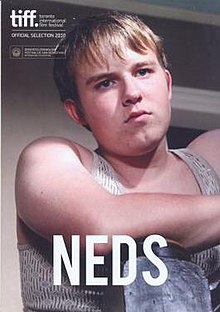
NEDS
UK, 2010, 124 minutes, Colour.
Conor McCarron, Greg Forrest, Joe Szula, Mhairi Anderson, Gary Milligan, Gary Lewis.
Directed by Peter Mullan.
Peter Mullan has had many decades strong career as an actor, in his native Scotland, and around the world, a distinctive screen presence. Great success with The maudlin Sisters and then Neds. Ned is one several Scottish BAFTA awards for best film and director.
The setting is Glasgow, 1970. The title refers to Non—Educated Delinquents, Needs. The film focuses on a young boy, John McGill (Greg Forrest) who is finishing in primary school with some success at his graduation, happy family, encouraging and visiting from America that he become a journalist, he very bookish and intelligent boy. However, there is a shadow with his older brother who is a delinquent with a bad reputation.
Then there is the drama of the transition from primary school to secondary school, the system of allotting students to classes, John feeling that he is in the wrong class, some brutal treatment from teachers, ridicule, and the shadow of his our brothers reputation. The father at home is alcoholic, brutal and shouting. The mother’s long-suffering. With a particular bully, John gets the help of his brother and the gang brutalising as John watches. A sign of things to come.
The main part of the film has John in his mid teens, played ball by, McCarron, still bookish, but becoming more defiant, caught up in the activity of the students, defying teachers in class, gradually a transition to becoming part of delinquent gangs, involved in fights and brutality.
Perhaps the film could have ended there as a moral warning. However, Peter Mullan screenplay continues with an opportunity for John to come to some kind of awareness of what has happened to him, making an option for a transition, a change of heart, a change of behaviour, and some prospects for the future.
For a Scottish audience, the Glasco accent is not a problem – but, for those outside Glasco, often very difficult to hear and understand, the need for a reliance on subtitles.
- The title, an abbreviation for non-Educated Delinquents?
- The Scottish atmosphere, the city of Glasgow, the neighbourhood, homes, streets, parks, school, gangs and thugs? The accent – and difficulties for audiences without some subtitled help? The musical score? The music and songs of the 1970s, atmosphere?
- The story of John McGill, Glasgow 1970, at primary school, the end of year and his awards, family, his aunt from the US and her encouraging him to journalism, at home, the alcoholic father and his solemn behaviour and shouting, his mother and her care, the older brother and his being a delinquent, the treatment of John at school, the new school, the bullying, Kanter, John going to his brother, the taking of Kanter and the brutality as John watched? The ambiguity for his character, keen reading, book 1, clever, in class, the role of the teachers and getting him to answer? But the bullies and the mockery?
- The new school, the allotting of classes, his being put in the wrong class, the behaviour of the teachers, the strap, severity, John going to the principal, a hangover from his brother’s bad behaviour, in the class? The effect on him?
- The moments of background of religion, the church, the communion sequence?
- John, older, the years passing, his love of learning? But the pressure, the bullying, his change of attitude, the defying of the teachers? His behaviour with the other students, the boys, interactions with the girls?
- Audience response to his change of character, moving with the boys, the pictures of the gangs, the interactions, the gangs respect for his brother, his confrontation with the earlier bully, Kanter? The scenes of the gangs, on the bridge, the fights?
- The consequences for John, change of character, his aunt’s visit and her surprise? His relationship with his mother?
- A surly teenager, moments of brutality and violence, the breaking down of his ideals?
- The confrontation, the motivation for his change of heart, the possibility for some kind of personal conversion, his taking action, improvement and development – and some hope for the future?
i"m Still Here
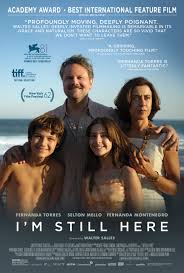
I’M STILL HERE
Brazil, 2024, 113 minutes, Colour.
Fernanda Torres, Selton Mello, Antonio Saboia, Fernanda Montenegro.
Directed by Walter Salles.
A drama that is well recommended. Nominated for many awards, it would it won the Academy Award for Best Foreign Language Film, 2024, was nominated in a number of categories. The star, Fernanda Torres, won a Golden Globe for Best Actress. The film has had 60 nominations for awards and 50 wins.
The director is Walter Salles, one of Brazil’s eminent directors, celebrated in the 1990s with international acclaim for Central Station. Director of many Brazilian films, he had international attention with his story of Che Guevara, The Motorcycle Diaries, and the thriller, Dark Waters, with Jennifer Connolly. His career is a fine cinema achievement.
In this film he is very much on home ground, Brazil in the 1970s, experiencing the military dictatorship – and a reminder that during the 1970s there was the turmoil in Chile, Allende and Pinochet, and the violent rule of the generals in Argentina.
The film opens joyfully, sunny, the beach, the water, happy family, the father a politician returned from exile, his strong-minded and loving wife, four daughters and a young son. It seems idyllic. But, an indication of difficulties to come, a group of youngsters are pulled over by the police, roughly treated, under suspicion, but let go. Despite the happy home sequences, the gatherings of friends, the zest for life, these are intimations of trouble to come.
The father, Rubens Paiva(Selton Mello) is genial, but suggestions that he is also involved in something subversive. But, the principal focus of the film is on his wife, Eunice, a powerful presence, an admirable performance by Fernanda Torres.
Heavy-handed officials take the husband away, and his wife is interned in a prison, echoes of torture and interrogations resounding in the darkness. One of the daughters is also taken. Because so much of Rio is seen in sunlight, the dark prison, the conditions, the harsh treatment, although one young guard is sympathetic and offers some information and support, the continued sense of menace, set the tone for the rest of the film.
Eunice pursues the search for her husband, supported by her family and friends, discovers the network of support for victims of the government. Eunice also decides, especially with police and government thugs continually parked outside the home, to take the family to San Paolo, wrenching sequence as the house is emptied and they drive away from the past.
Then a transition to the 21st century, Eunice having gone back for studies, heavily involved in legal issues and citizens rights, supported by the family and their families, especially the son, Marcelo, on whose book about his father this film is based. Here is a woman who started life with ordinary expectations, has suffered severely, has created a new life and career with significant public achievement.
Amid the joy, there is a sad aftermath, as Eunice has succumbed for years to dementia – and Walter Salles casting his award-winning star from Central Station, Fernanda Montenegro, as the elderly Eunice. And, as might be expected, there are photos of the actual characters during the final credits, tribute to them.
The experience of repression and suppression is destructive – but, it can also be a challenge to work for a better world.
- The status of the director, nominations and awards?
- Impact for a Brazilian audience? For audiences outside Brazil? Brazil’s history, military dictatorship, the 1970s?
- The Rio setting, the sea, the beaches, the mountains, buildings, streets, homes?&, Sells? The transition to San Paolo? The 21st-century, political activity, homes, reunions? The songs and musical score?
- The happy beginning, the sun, the water, swimming, the beach, the family, happy scenes at home? Rubens, his past career, on the left, exile and returned, his activities, keeping in touch with families of exiled letterwriters? Eunice, cheerful, in the house, her children, the oldest daughter and her studies, going to England? The older daughters? The children, Marcella and his vitality? The range of friends, dinners, meetings?
- The youngsters in the car, pulled over by the police, suspects, the rough treatment? Indication of themes to come?
- The intrusion into the house, the taking of Rubens? The taking of Eunice, of
- ear? The prison, the cells, dark, squalor? Eunice, the bewilderment, the interrogations, the fierceness of the interrogators? Some support from the sympathetic guard? The daughter, interrogation, about home? The books are photos, Eunice and her going over them, identification, her quest for her husband, her being let go?
- The aftermath of the arrest, the agents in the parked car outside the house, Eunice going out to confront them and their driving away? The contact with her friends, trying to get information, trying to get money from the bank and the need for her husband’s signature, gradual Revelation about the network for helping exiles? The support of friends, inability to help?
- The decision to leave Rio, to go to San Paolo, the reaction of the daughters, Marcella, the emptying of the house? Driving away?
- The strong characterisation of Eunice, in these situations? The portrait of the daughters, Varo and her going to London, communications, her return? The other daughters, is Lani and not wanting to leave Rio, the young children?
- The passing of time, Eunice and her going back to study, her achievements, political involvement, the family grown up, having their own families, the meetings, the honouring of Eunice?
- Her old age, dementia, her presence, the family gathering around her, the tributes, her smile?
- The next generation, Marcella, his accident, his family, writing the book?
- The tributes during the final credits, information, images? Portrait of a strong Brazilian character, female leadership?
Cats of Gokugo Shrine, The/ Gokogu no Neko

THE CATS OF GOKUGU SHRINE/ Gokogu no Neko
Japan, 2024, 119 minutes, Colour.
Directed by Kazuhiro Sôda.
Yes, many cats, especially in the early part of this film. We are in Japan, a small town which holds a popular Shinto shrine – the centre of prayer for the local people and for pilgrims. And it is something of a refuge for the wandering cats, Street cat’s (generally larger and will feed, plus some kittens – who are always cute!).
What is this film going to be. An explanation from the director. The director calls The Cats Of Gokogu Shrine an ‘observational film’ made using Soda’s own ‘Ten Commandments’, which includes no research, no scripts, no pre-set theme, no narration, no voiceovers, background music or preproduction research, and paying for his own production. These self-imposed rules are intended to minimise pre-conceptions and make way for unexpected discoveries.
So, first we discover the Cats. But then the action and the director’s interests move towards the inhabitants of the town, and quite some varying views about the Cats. There are some pleasing interviews with older people who have lived in Gokugo, have seen it prosper, have seen it settle. An old man who is quite articulate and good company as we listen to his reflections, meeting with a fisherman and a cheeky cat stealing his fish but also meeting with some tourists, especially a woman who can’t have a cat as a pet in her apartment block, feels overwhelmed by her work, and comes every couple of weeks or so to reunite with the cats and feel revived.
There is also a typhoon, the director himself involved, giving shelter to a ginger cat.
And then there is town Council and the director spending a lot of time at a meeting, perhaps too much time? enabling us to hear the various points of view about the prosperity or lack of prosperity of the town, and whether the cats are a blessing or whether they should be eliminated. There is an appeal this way to cat lovers as well as to those who would want to be rid of the cats. What about the mess the cats make around the town? More cats abandoned? Should there be a planned program for neutering? Or some terms for coexistence? And are they actually good for tourism?
A different excursion to Japan.
Bastion 36/ Squad 36
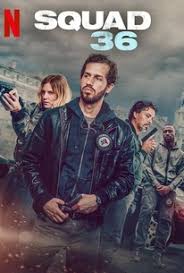
BASTION 36/SQUAD 36
France, 2025, 124 minutes, Colour.
Victor Belmondo, Tewfik Jalian, Yvan Attal Juliette Dol, Soufiane Guerrab.
Directed by Olivier Marchal.
Straightforward title, focus on a police squad, action, criminals, police corruption, cover-ups… In the French action style. Strong production values – but, the intricacies of the plot and characterisations sometimes defy credibility.
The film begins with quite a spectacular chase, the confrontation with the chief criminal and his defying of the officer who corners him. But, no arrest. The film then shows the officer participating in quite brutal bareknuckle fights, indicating skills he will have to use during the rest of the film. He has also been demoted. However, he is a dashing presence on screen at times, Victor Belmondo, and his surname gives an alert. He is a grandson of Jean-Paul Belmondo.
There are quite some complications in the squad, the passing on of information, big money deals, some greed, betrayals, and everything getting too much for one of the members of the squad who disappears from a mental institution.
Eventually, there are set ups, confrontations, betrayals, murders, the police authorities, including veteran Yvan Attal, who do not want any public scandals. The film is presented by Netflix – and is kind of Netflix streaming night in.
- The title, indications and expectations? French police, action, criminals, police corruption?
- The city settings, the streets, the chases, the confrontations, offices, homes, bare knuckle fighting? Atmosphere? The musical score?
- The initial chase, the role of the police, action spectacle? Antoine, his role, personality, the confrontation with Mahmoud? Backing off? No shootings? The setup for the future?
- The focus on Antoine, the authorities and their attitude, his membership of the squad, his violence, being stood down? The bareknuckle fight sequences? Time passing, the transfer, working with the other police?
- The situation, the criminal connections, drugs, money, deals, the corrupt police? Suspicions within the squad? Richard Esteves, his change of heart, in the institution, Antoine’s visit, seeing the former policeman getting his advice and information? Tracking down his fellow officers, finding Esteves?
- The other members, suspicions, actions, home sequences? Yet the violence, the killings, betrayals?
- Antoine, involvement, tracking down Esteves, with the officials, with Mahmoud and the confrontation?
- Popular entertainment, police action, police corruption, betrayals?
Dinosaur Project, The
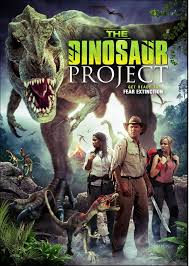
THE DINOSAUR PROJECT
UK, 2012, 83 minutes, Colour.
Richard Dillane, Matt Kane, Peter Brooke, Natasha Loring, Abena Ayivor, Stephen Jennings.
Directed by Sid Bennett.
Popular entertainment in 2012. The continued popularity, after Jurassic Park, speculations about dinosaurs and prehistoric creatures. The influence of The Blair Witch Project and the genre of “found footage”. There was also the memory of popular films of the 1970s, explorations, into the past, The Valley of Gwangi, Land that Time Forgot.
This film is very strong on the conventions of found footage, the characters provided with cameras, photographing the scenery, the creatures, their action, human reactions, and the characters talking to camera. Because it is found footage, the editing is in abrupt cuts from one piece to the other. And a lot of handheld camera, creating an atmosphere of exploration.
The presupposition of the story is an organisation in England, Cryptozoological, and television news about the sighting of a creature in Africa. An expedition is organised, a local guide, female, camera expert, of the members with one of them turning out to have violent rivalry, and the leader, very experienced, with encounters with his 15-year-old son who stows away for the expedition, and is instrumental in the crash of a helicopter, and some blame and acrimony from the violent member of the expedition, wanting to kill him in several confrontations.
The plot is conventional enough, the group lost in a kind of lost world, moving through the jungle, encountering the creatures, filming, hiding, menace and attacks. The 15-year-old, Luke, proves adept at science and technology, putting the camera on one of the creatures, establishing a relationship, feeding, spat upon (which is important eventually because it means that the other creatures accept him and not in the violent man who is about to kill him).
The film was shot in South Africa, vivid scenery and locations. There is some attention given to the characterisation but, mostly, to the leader and his son, the female doctor dying quickly into the action, the female guide becoming more hostile. The CGI of the animals, the creatures, is quite effective.
And, at the end, the authorities find the footage and begin to watch it.
Audiences interested in in searches for prehistoric creatures will find it intriguing in its way, but it is a short, modest, production
Spit
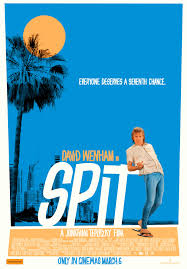
SPIT
Australia, 2025, 102 minutes, Colour.
David Wenham, Arlo Green, David Field, Gary Sweet, Lewis Fitz-gerald, Maude Davey, David Roberts, Helen Thomson, Andrea Moore, Pallavi Sharda.
Directed by Jonathan Teplitzky.
In 2002, there was an award-winning comedy-drama, Getting’ Square, set on the Gold Coast, the story of drugs, corrupt police, investigations – and the roguish character, John Francis Spitieri, whom everybody called Spit, an addict but reforming, thongs, old crumpled clothes, providing a great deal of comedy along the way.
It is not necessary for audiences to have seen Getting’ Square to enjoy this follow-up, focusing on Spit. In fact, the film has a lot of things going for it, indeed more than a lot of things. Writer, Chris Nyst, is a criminal lawyer and knows the characters that he has created for the original and for Spit. David Wenham has noted that he is an ambassador for Kings Cross’s Wayside Chapel and is very much aware of many variations on Spit. Both Nyst and Wenham won AFI awards back then and are candidates for 2025, an even better script, and Wenham having lived with this character over a long time.
The screenplay is alive, vivid life through the characters. We laugh out loud then, only minutes later, some moments of deep humane pathos on serious themes, then laughs again and throughout some serious and violent sequences connected with the thugs and the law. As mentioned, these characters were in the original and there are some references back, some clips from the original – and, with such admiration for the court scene in the original, another court scene which is as good.
But, this time, Spit returning to Queensland on a fake passport and detained by the authorities, is more of a larrikin, an Aussie larrikin rather than a rogue. His face is now weatherbeaten. And he has his ambling gate, the thongs, the jeans, weary on the surface but pretty shrewd when he wants to be – and this is especially the case in the inner unexpected solution to his problems.
He is still pursued by the drug chief and the corrupt police (snarling Gary Sweet and David Field). But, on landing he is sent to a detention centre, encountering the refugees, listening to their stories. His dealing with them, teaching English, is very enjoyable Australian comedy, especially in dealing with Australia’s and the world’s hyper- abundant F-word. Spit sees it not as an swear word but as an emphasiser (though he cannot quite pronounce that correctly). His class illustrating its variety of emphases is quite hilarious (even for those who do not yet use it) and is followed up with many variations on it throughout the film.
But, for pathos there is the story of Spit’s sister and their separation, foster homes, reunited, her son, her illness and the demands on Spit’s affection.
One of the clever aspects of the screenplay is the frequency of quips, word misunderstandings that provide a lot of wit. And there is the courtroom, David Roberts providing a prosecutor straight man to Spit’s mischievousness, and all about reading glasses. David Wenham shows how adept he is. We know he does serious well, but he really embodies the comic Spit.
And he plays alongside a number of Australian character actors, especially with New Zealander, Arlo Green, as a sympathetic Syrian refugee.
Jonathan Teplitzky directed Getting’ Square (and also directed Wenham in Better than Sex) and the excellent, The Railway Man.
This reviewer would enjoy watching it again and certainly laughing with it.
- The popularity of get in Square? A criminal world in Queensland? The quality of the screenplay and awards, David Wenham as spit and his awards? Welcoming him back with his own film?
- The Queensland settings, airports, detention centres, restaurants, funeral parlours, police precincts, the courts, gardens, the beach and the sea, hospitals? Atmosphere? The musical score?
- David Wenham’s portrait of Spit? His appearance, clothes, thongs, swagger? His vocabulary? The Australian larrikin, drugs in the past, criminal connections, reform, time in the UK, the Falls passport, arrival, behaviour at the airport, in the detention centre? Criminals discovering his being alive? The law and courts discovering that he was alive?
- His background, story of his childhood, parents, his sister, the fire, foster care? The reuniting, his sister, death, her son, the bonding with Spit, her illness, death? His responsibility for the boy? Talking to the authorities, the future for him and the boy?
- In the detention centre, Spit at something of a conman, taking the classes, listening to the stories of the refugees, giving them Australian names, vocabulary, the class on the use of the F word? Meeting with Jihad and his Syrian background story? Friendship?
- Chika, His role in the past, drugs, the violence, his thugs, connections? Wanting to get Spit, sending the thugs, Spit in the confrontations, escaping? De Viers, police, corruption, his assistant, manipulation, contact with Chika? Plots, arrests, abducting Spit, holding out the window, and that you are later revelation for the solution? Spit and his escapes, disguised as the woman, running through the suburbs?
- Jihad, out of detention, skill with flowers, his relatives, the welcome, the parties, at the funeral parlour, helping Spit, becoming more involved?
- Spit, going to the funeral parlour, memories of the first film, the wife, the money, setting up the funeral parlour with the money, Spit and his share in the ownership? Their involvement in saving Spit?
- Court, the police, tough attitudes towards spit, towards those in the detention centre? Hiring the lawyer, her style, pushy, ambitious, self promoting? In the court? Nile to, the past, wanting to get Spit, the prosecution in the court, Spit and his behaviour, language, the comedy with the glasses and is eventually stealing them in Tool losing them are not able to read the documents?
- The police and the court, Chika and his pressure on the criminal, the criminal turning round, killing Chika?
- The final Revelation, Spit and his writing on the wall, proving that he was abducted, vindicated?
- The 21st century Australian comedy, larrikin style?